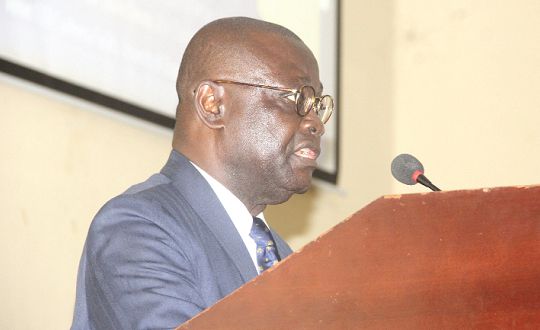
Avoid KNUST crisis - University of Ghana VC tells lecturers
The Vice-Chancellor of the University of Ghana, Professor Ebenezer Oduro Owusu, has asked lecturers of the university to find innovative ways of engaging students to ensure a healthy relationship with the student body.
Advertisement
“I don’t want a repeat of what happened at the KNUST on this campus. Just
The two-day conference, which is on the theme: “Prospects and Challenges of Humanities Research in the 21st Century”, has brought together more than 300 delegates from various universities in Ghana, South Africa, Benin and Nigeria.
The conference, which has faculty, graduate students and other stakeholders in academia from the participating countries, is being organised by the College of Humanities of the University of Ghana.
Internal mechanisms
Equally, Prof. Owusu underscored the need for the student leadership of the university to use internal mechanisms to address grievances and also take a cue from the mayhem that occurred at the Kwame Nkrumah University of Science and Technology (KNUST) which resulted in the destruction of properties.
He alluded to recent threats by the student leadership to embark on a demonstration which he gathered from intelligence but which was aborted and cautioned the students to seek redress using the appropriate channels.
The brouhaha that surrounded the mayhem at the KNUST last week initially led the dissolution of the university council and the subsequent closure of the university.
In apparent reaction to events at the university, Prof. Owusu said he had strong intelligence on the ground that any hint of violence on the university campus would get him to close down the school, even before any confusion took place.
“I will have the university closed down when I receive any intelligence pointing to any possible violence,” he added.
Provost welcomes
Welcoming the delegates earlier, the Provost of the College of Humanities, Prof. Samuel Agyei-Mensah, had said the college was home to a rich and diverse mix of academic disciplines.
“By breaking down traditional disciplinary boundaries, we aim to instil in our students the ability to think critically and challenge the status quo,” he submitted.
Prof. Agyei-Mensah told the delegates that the college had made modest strides since it went fully collegiate in 2014, with an enhanced research profile in consonance with the university’s vision of becoming a
The college professor alluded to the fact that many other initiatives had since been implemented to boost undergraduate education and faculty research and sought the support of stakeholders to enable the college to deliver on its mandate.
Keynote speaker
The keynote speaker, Professor Frederick Thomas Hendricks of the Rhodes University in South Africa, presented a paper on the topic: “Why study Arts when people are hungry? In defence of engaged scholarship in the humanities”.
He sought to dispel the myth that undermines the significance of humanities in world affairs and stressed that “there is clearly the need for all of us in the humanities to respond to this generalised derision”.
Prof. Hendricks noted that his position was not a narrow defence of the humanities nor a rallying cry for more funding for humanities research but rather an argument for an engaged humanities scholarship, committed to deciphering the social, political, economic and cultural challenges of the world.
Cut off risk
He posited that humanities research that was cut off from the messiness of the real work risked drifting into irrelevance and suggested that a scholarly engagement with the problems and the struggles of the people on the African continent was the source of inspiration.
“I think we must recognise the specific nature of our own continental challenges in order for us to address them in realistic, and I would hope, imaginative ways, using the full arsenal of our disciplines in the humanities,” Prof. Hendricks pointed out.
He took a strong exception to Ugandan President Yoweri Museveni’s recent decree directing government institutions not to employ graduates of humanities as planners because they were “useless”.
The South African professor described the President’s directive as emblematic of a wide-ranging attitude of disdain for the humanities, both on the African continent and in other parts of the world.



